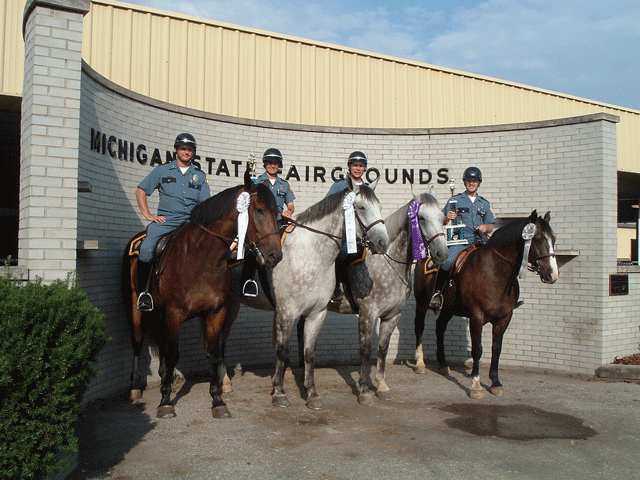
Oct. 3, 2013 — How familiar is familiar? When it comes to horses, people may think they know more than they really do.
Of all the livestock species, horses are the most commonly encountered by city dwellers and also the most frequently represented in mass entertainment. Horses occupy a space in our perception somewhere between livestock such as goats, sheep, pigs, or cattle, and companion animals. Whether it is founded on the horses of movie fame or occasional encounters with parade mounts or rental horses, this casual familiarity leads most people to think of horses’ behavior as similar to the animals they deal with more often, such as dogs or cats, or even to assign human characteristics to horses. (Think of Seabiscuit grumpy without a nap, the injured Hidalgo begging to race. More absurdly, Mr. Ed.) We all think we “know about” horses. But how much do we know?
The first lesson of the Animal Welfare Council’s six-part series, Lessons About the Unwanted Horse, helps to answer that question. “Is a Horse More Like a Cow or More Like a Dog?” points out differences and similarities between the species.
For young people with limited first-hand exposure to animal agriculture, learning the facts about horses can create an understanding of the common characteristics that horses share with other livestock species. Building on their knowledge may help these young people better appreciate the needs and challenges of the broader animal agriculture industry. Most certainly, these facts will help the young person interested in horses acquire a better understanding of how to manage and interact with this favored livestock species.
The Animal Welfare Council is offering the entire six lesson series at no cost through its website; the series is downloadable either as a package or in parts, at www.animalwelfarecouncil.org. Each lesson includes goals, background information, a teaching outline and resources for further study, plus student activities meant to underscore the lesson in various entertaining, lively ways. The underlying message reinforced in all six lessons is the vital importance of conscious, responsible horse ownership.
Based on current research by acknowledged industry experts, the curriculum is suitable for use in youth activity settings such as 4-H, Girl or Boy Scouts, or Pony Club as well as in traditional classrooms and home school programs. Lessons are designed 10-12 year-olds, but may be easily modified for older students, parents or other interested adults. Each lesson is aligned with stated Common Core State Standards and may be used to teach such skills as mathematics, writing, vocabulary building, reading comprehension, civics, understanding statistics and more.
Go to www.animalwelfarecouncil.org and download your copy today.
Animal Welfare Council members support the use of animals in recreation, entertainment, industry and sports. The organization is dedicated to advancing the responsible and humane use of animals in these activities. For more information about the AWC, visit www.animalwelfarecouncil.org.


